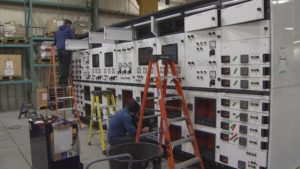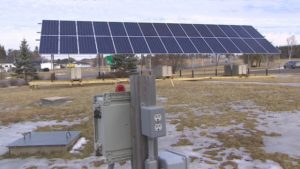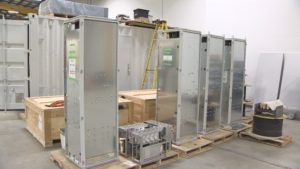Aspin Kemp takes lessons learned in marine technology to land

A P.E.I. company is taking what it has learned about green energy on ships and applying it on land.
Aspin Kemp & Associates is testing a new micro-grid system at its facilities in Poole’s Corner. It uses an array of solar panels and battery storage to generate electricity.
“It’s local power generation,” said Mike Newman, marketing manager at Aspin Kemp & Associates, who calls the project a prototype.
“It definitely will reduce our costs and in theory we could go completely off grid with this system and power the entire manufacturing facility through solar panels and energy storage.”
There are currently two panels, but there will be 610 panels in total later this spring. It’s estimated the solar energy could cut the company’s electricity costs in half.

Aspin Kemp has made a name for itself globally by improving the energy efficiency of engines on large ships.
“These vessels that we work on, they’re massive drill ships or service support vessels and they have big power generation needs,” Newman said.
“So a lot of the work that we do with batteries and energy storage and hybrid technologies is something we can incorporate.”
Massive fuel bills
Most of the ships the company works on have massive fuel bills, in the millions of dollars.
“We go into vessels and we drastically reduce their fuel consumption by in some instances up to 50 per cent,” Newman said.
“We’re using our power systems to more efficiently run those plants.”
The first part of the solar array is already installed in front of the company’s manufacturing facility in Poole’s Corner.
“Micro-grids is a very new technology, it’s a transition from generating power in big plants and then distributing that power,” Newman said.
“What micro-grids are, they’re much smaller power grids, so it’s an evolving landscape.”
Project for Canadian military
The company recently completed a micro-grid project for waste water production for the Canadian military.
“They wanted a system that could basically stand alone on itself without any requirement for diesel fuel,” said Jared MacDonald, business development manager for Aspin Kemp.
“So this system was designed so that all of the energy required was produced by the solar panels and stored in the batteries.”

The company has now delivered the micro grid to CFB Gagetown in Oromocto, N.B., and has already been fielding inquiries about other projects.
“We have a really wide demand and it’s not just for the Canadian military,” MacDonald said.
Progress in battery storage
“There’s all kinds of different systems from that size all the way up to powering an island nation, this system is completely scaleable and we’re really interested in taking advantage of that.”
The key, Newman said, is the progress in battery storage, so that solar energy can be stored even when the sun isn’t shining.
“The challenge has definitely been price of energy storage for a while but that is decreasing exponentially at a rapid rate, that’s why a lot of players are looking into this,” Newman said.
“It is really coming to the point where it’s becoming more and more economically feasible.”
Aspin Kemp has received government support for the energy projects.
“The technology that we work on is really about de-carbonization and reducing fuel consumption, reducing our dependencies on fossil fuels,” he said.


